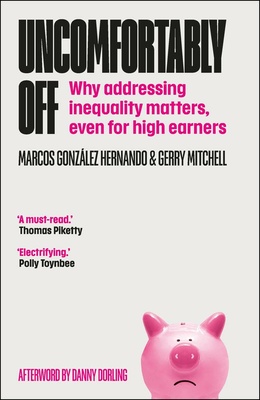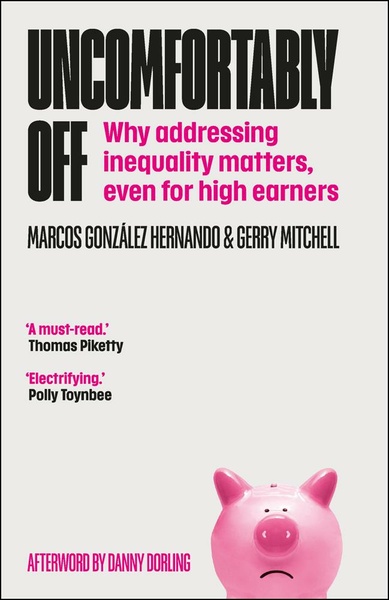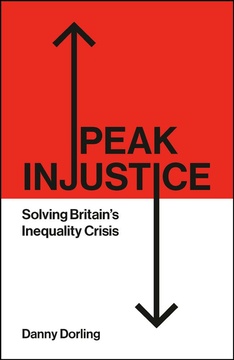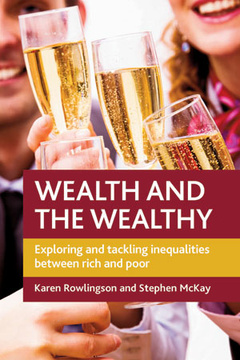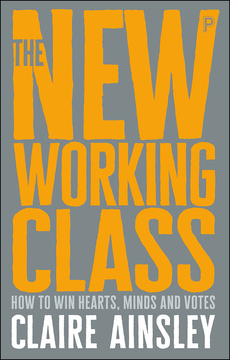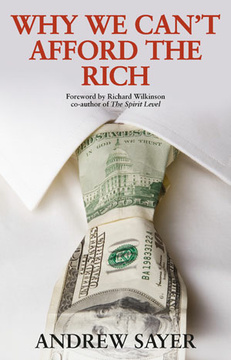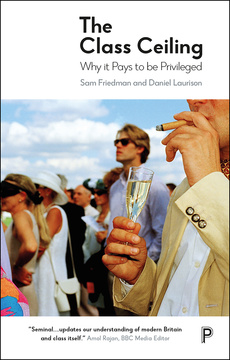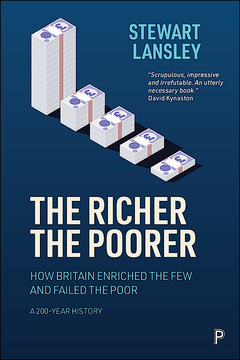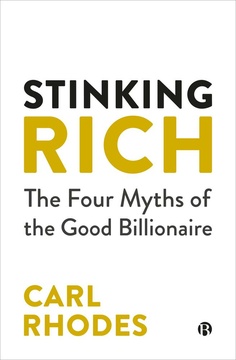Uncomfortably Off
Why Addressing Inequality Matters, Even for High Earners
By Marcos González Hernando and Gerry Mitchell
Published
May 14, 2024Page count
258 pagesISBN
978-1447367529Dimensions
216 x 140 mmImprint
Policy PressPublished
May 23, 2023Page count
258 pagesISBN
978-1447367512Dimensions
216 x 140 mmImprint
Policy PressPublished
May 23, 2023Page count
258 pagesISBN
978-1447367536Dimensions
216 x 138 mmImprint
Policy PressPublished
May 23, 2023Page count
258 pagesISBN
978-1447367536Dimensions
216 x 138 mmImprint
Policy PressIn the media:
Rishi Sunak thinks voters don’t care about his vast wealth, but the pollsters aren’t so sure in The Guardian
People earning £180,000 are now claiming to be feeling the pinch - the new 'uncomfortably off' in the iPaper
Why £125,000 does not make you rich in Britain today in The Telegraph
Why are Brits on £180k so sad? in The New Statesman
The Richest 10% Are Starting to Feel the Pinch, but Will That Change How They Think About Inequality? in Inequality.org
Should the top 10% of earners care about inequality? in Politics Relaxed
Uncomfortably Off in New Books in Critical Theory podcast
The Left Must Radicalize the Middle Class’s Fear of Downward Social Mobility in the Jacobin
Podcast: Uncomfortably Off: Why Higher-Income Earners Should Care about Inequality in New Books Network
Uncomfortably Off in Booklaunch Issue 17
Summer Reading List for Parliamentarians 2023 in the Publishers Association
Wealthy but worried: why the UK’s top 10% are turning their backs on the rest of society in The Conversation
To grasp the extent of inequality, look at the relatively well-off in LSE British Politics & Policy
Debate: The Common Good at How The Light Gets In
EXPERT HUB – BOOK BRIEFING: MOTIVATING HIGH EARNERS TO CARE ABOUT INCOME INEQUALITY in Inclusive Growth
EXPERT HUB – BLOG: HOW DO HIGH EARNERS PERCEIVE INEQUALITY? in Inclusive Growth
The quest for the common good in iai player
Peter Turchin on End Times: Counter-Elites and the Path of Political Disintegration for The Policy Institute at King's College London (YouTube)
Fear of falling in Inside Story
Private school parents are deluded if they don’t think they’re wealthy for i newspaper
Britain’s richest 10% don’t think they’re wealthy – and that’s disastrous in the fight against inequality for The Guardian
Why a six-figure salary no longer means you’re rich in The Telegraph
The 10% matter along with the 1% for the Institute of Art and Ideas
On our blog:
POLICY BRIEFING: Motivating high earners to care about income inequality
The spring budget is a return to normal that won’t even benefit the comfort off
PODCAST: Why high earners should care about inequality
How the top 10% can shift the Davos debate on wealth tax
Convincing high earners to care about inequality
In highly unequal societies such as the UK, where the top 10% take a higher share of disposable income than in most other European countries, many feel resentment towards high earners. On paper, they are doing well, but inequality isn’t even working for them.
Uncomfortably Off reveals that those generally considered to be the most affluent feel anxious about the future and struggle to keep up, or even to stay put. They are starting to doubt their common sense ideas about hard work and meritocracy as work pays less and less and life is becoming more uncomfortable.
This book makes two crucial arguments. First, reducing income inequality will benefit everyone, even those quite near the top. Second, we need to understand the anxieties of high earners to understand their politics. As leading managers and professionals they have disproportionate influence on the institutions that rule over our public life. Their interests are ultimately not that dissimilar from those of the median earner: being able to afford a good quality of life in an ever more expensive and uncertain world.
The hope of this book is to prompt high earners to question accepted truths and long-held beliefs that affect how they see themselves and judge others. In doing so, it seeks to help us all understand why dismissing the concerns of this group will not help in the fight to solve inequality.
“If capitalism isn’t working for the top ten percent, then it's not working at all. This brilliant book tells us why and what we need to do about it” Neal Lawson, Compass
“Anyone interested in tackling the grotesque levels of inequality in our society needs to understand what the top 10% think, what motivates them and what will convince them that change is necessary. This book goes beyond a mapping of the economic status and attitudes of this influential top 10% and provides a fascinating insight into the choices that confront them and the potential there is to recruit them for progressive change.” John McDonnell MP
“Justice needs to start with the top 1%. But real political and economic change will have to involve the top 10%, both as political actors and taxpayers. A must-read.” Thomas Piketty, Paris School of Economics and author of A Brief History of Equality
“A brilliant study in how understanding the fears, feelings and hopes of the best-off tenth of our societies helps explain why we hold so tightly to inequality.” Danny Dorling, University of Oxford
“An excellent book that looks at how more and more sections of society are likely to move down the income ladder than up it.” Richard Burgon MP
Marcos González Hernando is Honorary Research Fellow at the UCL Social Research Institute, Postdoctoral Researcher at Universidad Diego Portales and Adjunct Researcher at the Centre for the Study of Conflict and Social Cohesion.
Gerry Mitchell is a freelance policy researcher, working most recently for the Think-tank for Action on Social Change (Dublin), Friedrich-Ebert-Stiftung (Stockholm and London) and the Foundation for European Progressive Studies (Brussels).
Introduction: Why bother with the well-off?
1. Not billionaires, but well-off?
2. On the ubiquity and invisibility of the upper-middle class
3. ‘Work is life, that’s it’
4. Don’t rock the boat: politics and the well-off
5. Business class tickets for a sinking ship
6. Jumping ship, but where to?
7. Barriers to being comfortably off
8. ‘When the facts change, I change my mind’
Conclusion: Accepted truths, social distance and discomfort







